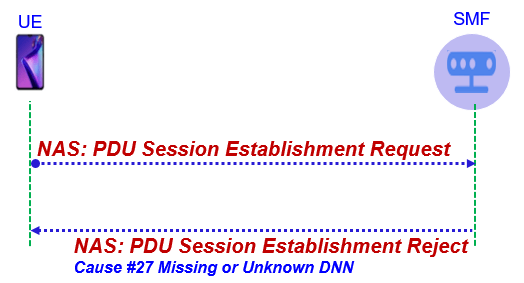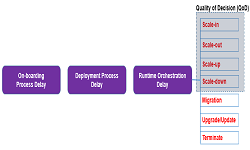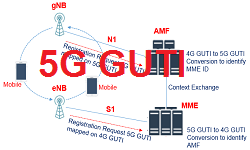5G NAS – PDU Session Reject Cause Values and Reasons
5G connectivity service is named as PDU Session. A PDU session is very similar to an EPS bearer in LTE, except for the QoS model and the supported user data. In transport point of view, a PDU session is made by a sequence of NG tunnels in 5G Core, and of one or more radio bearers on the radio interface. This set of “pipes” eventually connects the UE to its control functions and to the external data network for user traffic exchange as shown in following picture.

In 5G Core Network, the Session Management Function (SMF) supports 5G Session Management cause handling for the PDU-Session-Establishment, PDU-Session-Modification and PDU-Session-Release procedures. When 5G Core is not manage the session it should sent an appropriate SM cause over the N1 message to the UE.
Some of the possible cause values and behaviors are listed below.
PDU Session Establishment Reject
If the connectivity with the requested DNN is rejected by the network, SMF sets the 5G Session Management (5GSM) cause IE of the PDU Session Establishment Reject message to indicate the reason for rejecting the PDU Session Establishment procedure.

- Cause #26 – insufficient resources
- If the PDU session cannot be established due to resource unavailability in the UPF, the SMF shall include the 5GSM cause value #26 “insufficient resources” in the 5GSM cause IE of the PDU SESSION ESTABLISHMENT REJECT message.
- The SMF includes this cause when it receives N2SmInfoType with “PDU_RES_SETUP_FAIL” along with any of the
following N2 causes:- Radio Network/Radio Resources not available
- Radio Network/Failure in the radio interface procedure
- Misc /Not enough user plane processing resources
- Cause #27 – missing or unknown DNN
- SMF sends this cause when DNN is not present in SmContextCreateData even though it is required and not configured in SMF
- Cause #28 – unknown PDU session type
- SMF includes this cause when the PDU Session Establishment Request message includes a PDU session type that is not supported by SMF
- If the PDU SESSION ESTABLISHMENT REQUEST message includes a PDU session type IE set to “IPv6″, and the subscription, the SMF configuration, or both, support none of “IPv4” and “IPv6” PDU session types for the requested DNN, the SMF shall include the 5GSM cause value #28 “unknown PDU session type”
- If the PDU SESSION ESTABLISHMENT REQUEST message includes a PDU session type IE set to “IPv4”, and the subscription, the SMF configuration, or both, support none of “IPv4” and “IPv6” PDU session types for the requested DNN, the SMF shall include the 5GSM cause value #28 “unknown PDU session type”
- If the PDU SESSION ESTABLISHMENT REQUEST message includes a PDU session type IE set to “IPv4v6”, and the subscription, the SMF configuration, or both, support none of “IPv4v6”, “IPv4” and “IPv6” PDU session types for the requested DNN, the SMF shall include the 5GSM cause value #28 “unknown PDU session type”
- If the PDU SESSION ESTABLISHMENT REQUEST message includes a PDU session type IE set to “Unstructured” or “Ethernet”, and the subscription, the SMF configuration, or both, do not support the PDU session type for the requested DNN, the SMF shall include the 5GSM cause value #28 “unknown PDU session type”
- Cause #29 – user authentication or authorization failed
- The SMF includes this cause when DN authentication of the UE was performed and completed unsuccessfully.
- Cause #31 – request rejected, unspecified
- If the received request type is “initial emergency request” and there is already another emergency PDU session for the UE, the SMF shall reject the PDU SESSION ESTABLISHMENT REQUEST message with 5GSM cause #31 “request rejected, unspecified” or release locally the existing emergency PDU session and proceed the new PDU SESSION ESTABLISHMENT REQUEST message
- Cause #32 – service option not supported
- SMF sends this cause when the validation of received S-NSSAI fails against the allowed list of S-NSSAI
- Cause #33 – requested service option not subscribed
- SMF sends this cause when the UE requests a service option for which it has no subscription
- Cause #38 – network failure
- SMF sends this cause when the requested service was rejected due to an error in the network. This includes any internal
failures or no response from any external NF during the PDN-setup procedure
- SMF sends this cause when the requested service was rejected due to an error in the network. This includes any internal
- Cause#46 – out of LADN service area
- If the UE requests a PDU session establishment for an LADN when the UE is located outside of the LADN service area, the SMF shall include the 5GSM cause value #46 “out of LADN service area”
- Cause#50 – PDU session type IPv4 only allowed
- If the PDU SESSION ESTABLISHMENT REQUEST message includes a PDU session type IE set to “IPv6”, and the subscription, the SMF configuration, or both, are limited to IPv4 only for the requested DNN, the SMF shall include the 5GSM cause value #50 “PDU session type IPv4 only allowed”
- Cause#51 – PDU session type IPv6 only allowed
- If the PDU SESSION ESTABLISHMENT REQUEST message includes a PDU session type IE set to “IPv4”, and the subscription, the SMF configuration, or both, are limited to IPv6 only for the requested DNN, the SMF shall include the 5GSM cause value #51 “PDU session type IPv6 only allowed”
- Cause #54 – PDU session does not exist
- SMF sends this cause when it does not have any information about the PDU session which is requested by the UE to transfer between 3GPP access and non-3GPP access or from the EPS to the 5GS
- Cause #70 – missing or unknown DNN in a slice
- The SMF sends this cause when the slice configuration is present but the requested DNN is not configured under the slice
in the SMF
- The SMF sends this cause when the slice configuration is present but the requested DNN is not configured under the slice
- Cause #95 –Protocol Error or Semantically incorrect message
- This 5GSM cause reports receipt of a message with semantically incorrect content. For mandatory parameters (PDU Session Identity and Procedure Transaction Identity) with non-semantical error also, the SMF sends this cause
PDU Session Modification Reject
If the SMF does not accept the request to modify the PDU session, it sets the 5G Session Management (5GSM) cause IE of the PDU Session Modification Reject message to indicate the reason for rejecting the PDU session modification procedure.

- Cause #43 – Invalid PDU session identity
- The SMF sends this cause when SMF does not have the session
- Cause #95 – Protocol Error or Semantically incorrect message
- This 5GSM cause reports receipt of a message with semantically incorrect content. For mandatory parameters (PDU Session
Identity and Procedure Transaction Identity) with non-semantical error also, the SMF sends this cause
- This 5GSM cause reports receipt of a message with semantically incorrect content. For mandatory parameters (PDU Session
PDU Session Release Reject
If the SMF does not accept the request to release the PDU session, SMF sets the 5G Session Management (5GSM) Cause IE of the PDU Session Release Reject message to indicate the reason for rejecting the PDU session release.

- Cause #43 – Invalid PDU session identity
- The SMF supports sends cause when SMF does not have the session
- Cause #95 – Protocol Error or Semantically incorrect message
- This 5GSM cause reports receipt of a message with semantically incorrect content. For mandatory parameters (PDU Session
Identity and Procedure Transaction Identity) with non-semantical error also, the SMF sends this cause
- This 5GSM cause reports receipt of a message with semantically incorrect content. For mandatory parameters (PDU Session
Reference:
- 3GPP TS 23.501 5G; System Architecture for the 5G System
- 3GPP TS 23.502 5G; Procedures for the 5G System
Related Post:
- 5G System Connection Management: CM-Idle and CM-Connected
- 5G NR Global Unique Temporary Identifier (GUTI)
- 5G Identifiers SUPI and SUCI
- 5G Authentication and Key Management 5G-AKA



